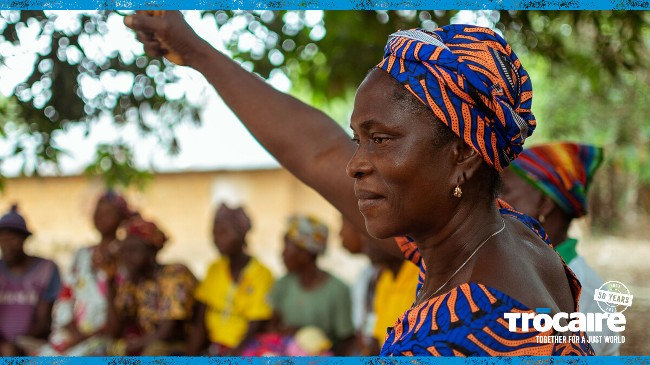By Claudia Caselli.
On the occasion of its 50th anniversary, last September 7, the Irish NGO Trocaire organized a conference focused on the closing of spaces with a localization perspective. The conference addressed very relevant topics: strategies for mentoring development actors and civil society in contexts of civic closures, and how to promote a shift of power and localization towards the global South.
Both the conference and the experiences of the guests helped us to broaden our perspective on each of the contexts described. For this reason, we value Trocaire’s initiatives, their willingness to challenge the established system, and share their struggle to raise awareness of issues that require a strong and joint response from the international community. We participated in the event and this is a summary of what was discussed:
Participants in this exchange included Fionnuala D. Ní Aoláin, UN Special Rapporteur on the promotion and protection of human rights and fundamental freedoms while countering terrorism; Claudia Paz y Paz, Director of the Central America and Mexico Program of the Center for Justice and International Law; Musa Kika, Executive Director of the Zimbabwe Human Rights NGO Forum; and James Ngun Hre, Country Director of Karuna Mission Social Solidarity in Myanmar.
Direct experience with space closures
To begin with, Fionnuala Ní Aoláin testified to the role of laws in closing spaces. Laws are often modified to reduce civil society freedoms, as well as to limit the action and close the voice of NGOs. Activists and development actors risk their lives to support populations without guarantees for their safety. The situation seems to be getting worse, and it is estimated that less than 4% of the global population lives in societies with a truly free civic space.
On the other hand, Claudia Paz y Paz spoke about the situation in Guatemala and how all state institutions – including the judiciary – support and back state authoritarianism. The strategy is to cut freedoms – such as freedom of expression, association, and intervention of development actors – and to do so they use laws, such as the 2020 law that has restricted the functioning of social organizations.
In turn, Musa Kika explained how the propaganda narrative works. This supports the limiting action of governments and their laws, which damages sovereignty or national interests, criminalizing the action of civil society and development actors to convince public opinion that «they must have done something», and therefore it is necessary to repress it. At the same time, Kika commented that there is less and less investment on the part of international cooperation in the face of closing spaces: donors do not feel safe giving resources to threatened organizations. The combination of these factors means that the situation is worsening rapidly, without measures to prevent space closures.
Later, James Ngun Hre attested to the difficulty of action in Myanmar: a territory where humanitarian needs continue to grow. There are many constraints for development actors, as they are not even allowed to talk about the need for aid that the country requires.
Many ways to explore
Is there a solution to act in such complicated contexts? There is no single answer for all territories. However, there are strategies to make NGO action much more effective. Strengthening alliances and national and international networks is fundamental to making complementary use of our action: a strong response is required from the international community, one that condemns and sanctions human rights violations. The pronouncements and resolutions of international organizations are useful for building an alternative narrative and ensuring that the affected populations do not feel abandoned by their fate. But mobilization is also important: the use of social networks to reach a different and young audience can raise awareness of the issue and provoke a strong reaction from international civil society.
Cooperation has a lot to change. Traditional NGOs need to be reimagined to transform the sector. Trocaire uses the power transition model at the local level: the organizations in the affected territory have the least constraints and the most capacity for action, together with their local knowledge. In addition, trust between the community and civil society organizations is key, as both know each other and have to work based on this common trust. Supporting and training national actors is essential to have an important impact where there is closure, local ones have to lead the agenda. For this to be possible, it is necessary to change from a traditional relationship to a more innovative one that promotes localization, as well as to encourage donors to trust in the capacities of local organizations.
The process seems long and difficult and there is a tendency to discouragement: nothing is enough, nothing works. Change does not happen in a day; we are aware that there are many obstacles along the way. However, at Sherwood, we believe that change is possible and that international cooperation can play a fundamental role in this. For this reason, we continue to research and analyze the best strategies so that, one step at a time, the change that now seems unfeasible can become a reality.
In addition, the closing of spaces is an issue that we at The Sherwood Way are also deepening.
Today, democracy is threatened by repressive autocracies that are expanding rapidly and continue to reduce the space for the action of cooperation, limiting its initiatives and closing contact with civil society. Cooperation seeks to put a brake on repressive policies and support the demands of the affected populations.
Therefore, we work to help NGOs to be versatile and able to respond to unexpected changes. In our Learning Network, we are working with Trocaire and other NGOs to analyze strategies for acting in these unpredictable contexts. We believe that Trocaire’s approaches to closing spaces and systemic change can be transformative because they seek real change. This is one of the reasons why we continue to work together, to make the goal a reality.



